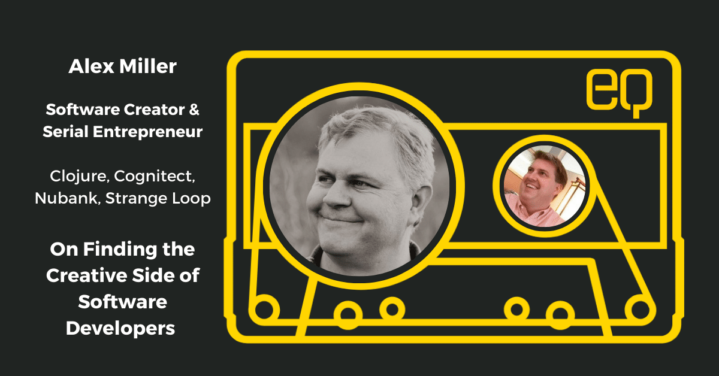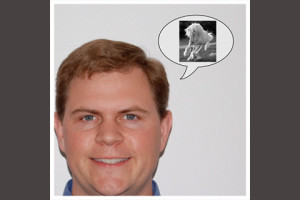
Strange Loop Explores Creative Side of Software Developers
Developers aren’t just machines that write code.
Alex Miller is a St. Louisan who’s become an expert at creating community for talent to grow and succeed in.
By day, he is one of the top contributors to Clojure an open source programming language that fits between relational and graph-based databases (and driving digital banking systems for innovators like Nubank the largest fintech in Latin America).
In his spare time, Alex launched and runs Strange Loop one of the most successful independent conferences for developers, bringing software talent from around the world together in St. Louis.
In this conversation with Dan Reus, Alex shares about the care and feeding of software developers – and how meaningful problems, meeting people outside your domain, social issues, the City Museum, and helping talent find their voices all matter in inspiring and sustaining that talent.
Editor’s Note: Like many conferences, Strange Loop had to take a break in 2020. It returned in 2021 when this interview was recorded, but EQ missed the publishing window (my bad!). As Strange Loop have just announced their Call for Speakers for the conference in 2022, we thought this would be an opportune time to revisit this conversation on tech culture between Dan Reus, founder of Openly Disruptive and Alex Miller, founder of Strange Loop.
Alex Miller speaks your language. That means English, of course, but he’s also one of the top contributors with Clojure, an open source programming language.
Amongst many other things, Clojure drives the digital banking systems for innovators like Nubank, the largest neobank in Latin America.
Alex also runs Strange Loop, one of the most successful independent conferences for developers. It brings software talent from around the world together in St. Louis.
Read on to learn about Alex’s passion for getting developers to share their stories and how he gets them inspired at the City Museum.
Why Clojure?
Clojure is a general purpose programming language. It’s become associated with the FinTech industry where it makes data and information easy to work with and manipulate.
“Almost everything is centered around the question, ‘How do we do that?’”Alex explains.
Having used Clojure for a few years, Alex had become excited by it, got to know its creators and ended up working on the language itself in a community steward relationship role.
A Problem Shared is a Problem Solved
Alex explained some of the differences between working for Clojure and working for companies that actually use the language.
“It’s a little bit different when you’re inside a company,” he says, “That’s because you have stakeholders who want you to make something or satisfy a market need. When you’re building an open source, general purpose language, it’s up to you to figure all that out.”
He does this by finding out how people are using language and where they’re struggling. “You’re trying to funnel a whole bunch of inputs to find out what problems users are having and how you can help them out by making changes in the software,” he says.
Backwards and Forwards
Users may often look to him for tweaks that would make something more useful to them. Often though, a better solution would be to offer them something completely different.
This, he explains, comes from talking to users and working backwards with them through a particular process. Drilling down into the actual problem is the best way to find the right solution, he says.
When building a programming language, it’s important, Alex says, not to break something by adding something new. At the same time, whatever is added mustn’t prevent other things being bolted on in the future. It’s all about figuring out compatibility with past as well as with future designs. This is something Alex describes as an art form.
Anticipating Change
The key is to be able to build a system that actually anticipates that you’re always going to need to change your software, and to come up with language features which ideally make that easy.
One of the differentiators with Clojure is the importance given to the time taken to design and develop software.
Clojure, Alex explains, is designed around a small set of core data structures, and a broad set of transformations that can occur on those data structures. Every Clojure program fits the pattern of representing particular domains in that small set of data structures, Alex says.
Strange Loop Was Born
Alex launched this ‘Developers get together’ over ten years ago. This was at a time when people were looking for alternatives to programs they’d been using for years.
There was an explosion of new programming languages, including Clojure. New opportunities like data storage in the cloud were opening up.
Alex was aware of individuals and user groups all over the place who were exploring these different languages and databases. He managed to get over a hundred of them together at his first event.
“There was absolutely an audience for that kind of thing. The first conference ended up expanding into a day and a half. Then it just kind of exploded from there,” he says.
Industry Leaders Meet Academics
At Strange Loop, Alex tried to mix industry leaders who were working with new languages and databases with computer science professors and people who were working on theory.
“Those two groups often don’t have the opportunity to talk to each other. Bringing these two worlds together in a way that they could feed off of each other was something that was always a goal,” he explained.
Some speakers have brought unexpected insights to Strange Loop. Idalin “Abby” Bobé is a technology activist and social entrepreneur.
An Afro-Latina, she shared her experience about how young people in Ferguson, Missouri, went from protesting against police brutality after the killing of Michael Brown in 2014 to learning technology skills and bringing the revolution to the cloud.
Finding Inspiration
Strange Loop has made a point of looking at how programming can affect the world. That includes in areas like the arts. There have been workshops, for example, which have involved making music or creating interactive fiction with different kinds of programming technology.
“One of the things I find the most rewarding is to go out and find people who haven’t actually done a lot of speaking but who have something really interesting to say,” Alex says.
Alex has found the location for part of his event has inspired its delegates. “We’ve been holding the party at City Museum for a long time,” Alex says. “We take over the whole museum and fill it full with a bunch of developers. It’s mind blowing. You get to see things through other people’s eyes.”
Some Final Words From Alex
“Developers want to do work that’s interesting and challenging. Anything you can do to create structures that help them do that is great,” he says.
Save the Date: Strange Loop is a developer-focused conference that encompasses past (the history of computing), present (deep dives on today’s technology), and future (what’s next).
Block off September 23-24, 2022 on your calendars and stay tuned to buy tickets here.
